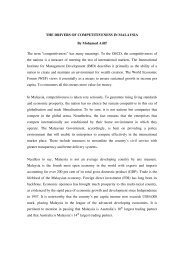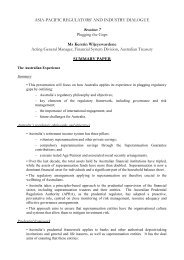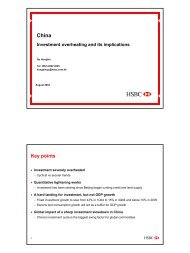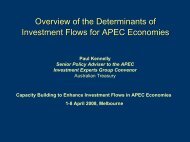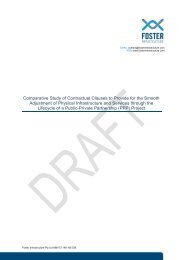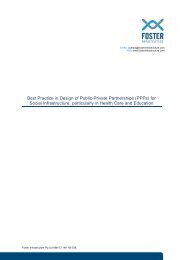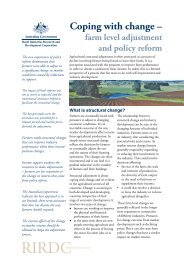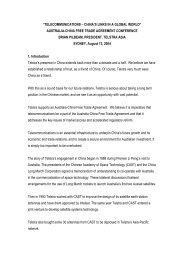Comparative Study of Contractual Clauses to Provide for the Smooth ...
Comparative Study of Contractual Clauses to Provide for the Smooth ...
Comparative Study of Contractual Clauses to Provide for the Smooth ...
- No tags were found...
Create successful ePaper yourself
Turn your PDF publications into a flip-book with our unique Google optimized e-Paper software.
<strong>Comparative</strong> <strong>Study</strong> <strong>of</strong> <strong>Contractual</strong> <strong>Clauses</strong> <strong>for</strong> <strong>the</strong> <strong>Smooth</strong> Adjustment <strong>of</strong> PhysicalInfrastructure and Services through <strong>the</strong> Lifecycle <strong>of</strong> a PPP ProjectAugust 20124.1.7 Pre-agreed variationsIn some PPP projects, a possible future variation can be identified at <strong>the</strong> time <strong>the</strong> project isinitially tendered. By asking bidders <strong>to</strong> <strong>of</strong>fer a fixed price <strong>for</strong> <strong>the</strong> variation at <strong>the</strong> time <strong>the</strong>ylodge <strong>the</strong>ir tenders <strong>for</strong> <strong>the</strong> project, government can benefit from pricing <strong>the</strong> variation in a verycompetitive environment and can <strong>the</strong>n request <strong>the</strong> private party <strong>to</strong> proceed with <strong>the</strong> variationat a later date. The Australian Social Infrastructure Principles, Australian EconomicInfrastructure Principles, UK SOPC 4, and South African Standardised PPP Provisions eachprovide <strong>for</strong> such variations <strong>to</strong> be included in <strong>the</strong> PPP contract 12 .4.2 O<strong>the</strong>r <strong>Clauses</strong> that <strong>Provide</strong> Flexibility in PPP ContractsAlthough variation clauses are <strong>the</strong> primary means by which PPP Frameworks introduceflexibility in<strong>to</strong> PPP contracts and allow <strong>for</strong> changes in <strong>the</strong> physical infrastructure or <strong>the</strong>services, a number <strong>of</strong> o<strong>the</strong>r clauses found in PPP contracts can also provide flexibility insome circumstances. Common examples include change in law clauses and governmentvoluntary termination clauses.4.2.1 Change in Law clausesGovernments commonly change laws that affect <strong>the</strong> cost <strong>to</strong> <strong>the</strong> private sec<strong>to</strong>r <strong>of</strong> doingbusiness without compensating private sec<strong>to</strong>r businesses <strong>for</strong> this impact. However, in aPPP, <strong>the</strong> private party generally cannot unilaterally increase its prices or diversify itsbusiness so as <strong>to</strong> <strong>of</strong>fset <strong>the</strong> cost impact <strong>of</strong> <strong>the</strong> change in law. Consequently, each <strong>of</strong> <strong>the</strong>PPP Frameworks examined in this study provides some protection <strong>for</strong> private parties against<strong>the</strong> impact <strong>of</strong> changes in law, ei<strong>the</strong>r through a specific “change in law” clause or (in <strong>the</strong> case<strong>of</strong> <strong>the</strong> South African Standardised PPP Provisions) through more general provisionsconcerning risks that <strong>the</strong> private party can face as a result <strong>of</strong> government actions 13 .Where government proposes a significant policy change that will affect a PPP project, it maybe possible <strong>to</strong> implement that change through ei<strong>the</strong>r <strong>the</strong> variation process or <strong>the</strong> change inlaw process. In <strong>the</strong>se circumstances, government should consider <strong>the</strong> relative merits <strong>of</strong> eachprocess, including <strong>the</strong> impact upon value <strong>for</strong> money and <strong>the</strong> long term PPP relationship.4.2.2 Government Voluntary Termination clausesThe intention <strong>of</strong> all parties <strong>to</strong> a PPP contract should be that it will run its full course. Theremay be circumstances, however, in which government is no longer able <strong>to</strong> continue <strong>the</strong> PPPrelationship. For example, <strong>the</strong>re may be a policy change which makes fur<strong>the</strong>r provision <strong>of</strong><strong>the</strong> services specified in <strong>the</strong> contract redundant 14 . For this reason, it can be argued thatgovernment should have a right <strong>to</strong> voluntarily terminate a PPP contract (also known astermination <strong>for</strong> convenience), even if <strong>the</strong> private party has fully complied with its obligations.12 Australian Social Infrastructure Principles, section 19.7; Australian Economic InfrastructurePrinciples, section 18.5; UK SOPC 4, section 13.1.4; South African Standardised PPP Provisions,section 50.3.2.13 Australian Social Infrastructure Principles, section 20; Australian Economic Infrastructure Principles,section 19; UK SOPC 4, section 14; South African Standardised PPP Provisions, section 49; NHAIToll Road Contract, clause 36; NHAI Annuity Road Contract, clause 11.14 UK SOPC 4, section 21.5.1.Page 24 <strong>of</strong> 35Foster Infrastructure




